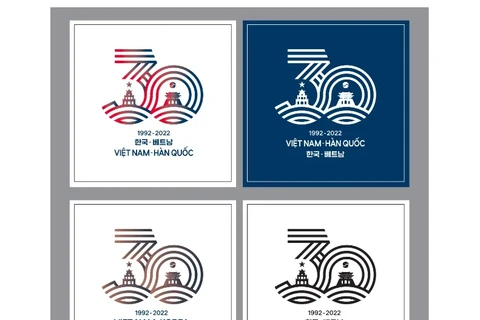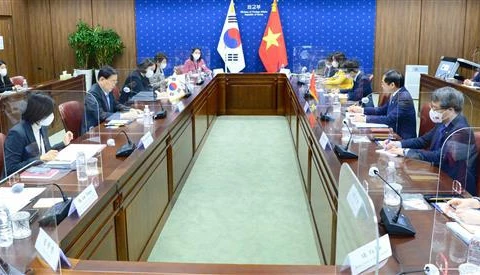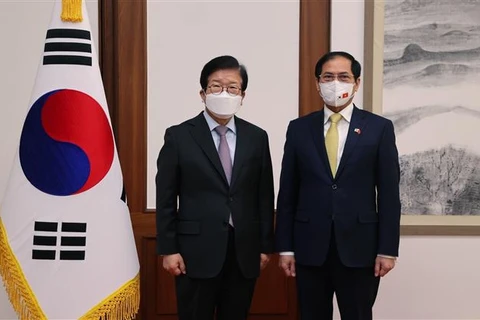Seoul (VNA) – The Ministry of Oceans and Fisheries (MOF) of the Republic of Korea (RoK) is implementing the first-year technical cooperation project for aquaculture productivity enhancement in Vietnam’s northern provinces.
This is part of the ministry’s official development assistance (ODA) endeavours, the ministry said on February 21.
As a model of interdepartmental collaboration that combines the Korea Forest Service’s ongoing mangrove reforestation efforts, covering 30 hectares for 2020-2024 with a budget of 4.5 billion KRW (3.78 million USD) and the MOF’s aquaculture expertise, the project is expected to restore habitats rich in organic matter through mangrove rehabilitation and create synergy with shellfish farming.
More specifically, through the project, the MOF will modernise aging seed production facilities and idle aquaculture sites in northern Vietnam as well as dispatch Korean aquaculture experts to the region for technology transfer and capacity-building education.
These measures are expected to revitalise aqua farming in the region and raise income levels in local communities.
The coastal region in northern Vietnam, the target area of the project, is home to mangrove forests and tidal wetlands. After 1995, the region experienced a “Golden Era” with a booming shellfish farming industry.
However, the overfishing of marine resources and coastal environmental degradation in recent years have had grave implications on the natural production of seed clams, causing disruptions in the supply of clam seeds and, in turn, a sharp drop in shellfish harvests.
To address this, the Vietnamese government requested the RoK side share its leading aquaculture farming techniques.
After a two-year pilot project, the full-scale project will be implemented from 2022 to 2026 with a total budget of 3 billion KRW (2.52 million USD).
“This is our first ODA project that integrates our advanced aquaculture and reforestation techniques,” said Kim Hyun-Tae, Director General for International Cooperation Policies at the MOF.
“We expect that this will not only resuscitate Vietnam's sluggish aquaculture production, but also provide an inroad for Korean aquaculture feed and facility businesses to enter overseas markets.”/.
This is part of the ministry’s official development assistance (ODA) endeavours, the ministry said on February 21.
As a model of interdepartmental collaboration that combines the Korea Forest Service’s ongoing mangrove reforestation efforts, covering 30 hectares for 2020-2024 with a budget of 4.5 billion KRW (3.78 million USD) and the MOF’s aquaculture expertise, the project is expected to restore habitats rich in organic matter through mangrove rehabilitation and create synergy with shellfish farming.
More specifically, through the project, the MOF will modernise aging seed production facilities and idle aquaculture sites in northern Vietnam as well as dispatch Korean aquaculture experts to the region for technology transfer and capacity-building education.
These measures are expected to revitalise aqua farming in the region and raise income levels in local communities.
The coastal region in northern Vietnam, the target area of the project, is home to mangrove forests and tidal wetlands. After 1995, the region experienced a “Golden Era” with a booming shellfish farming industry.
However, the overfishing of marine resources and coastal environmental degradation in recent years have had grave implications on the natural production of seed clams, causing disruptions in the supply of clam seeds and, in turn, a sharp drop in shellfish harvests.
To address this, the Vietnamese government requested the RoK side share its leading aquaculture farming techniques.
After a two-year pilot project, the full-scale project will be implemented from 2022 to 2026 with a total budget of 3 billion KRW (2.52 million USD).
“This is our first ODA project that integrates our advanced aquaculture and reforestation techniques,” said Kim Hyun-Tae, Director General for International Cooperation Policies at the MOF.
“We expect that this will not only resuscitate Vietnam's sluggish aquaculture production, but also provide an inroad for Korean aquaculture feed and facility businesses to enter overseas markets.”/.
VNA























